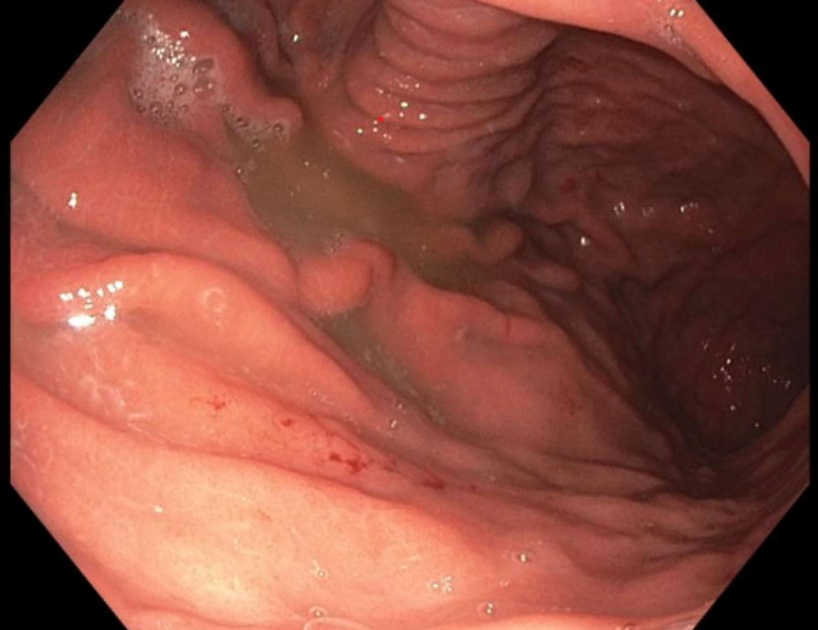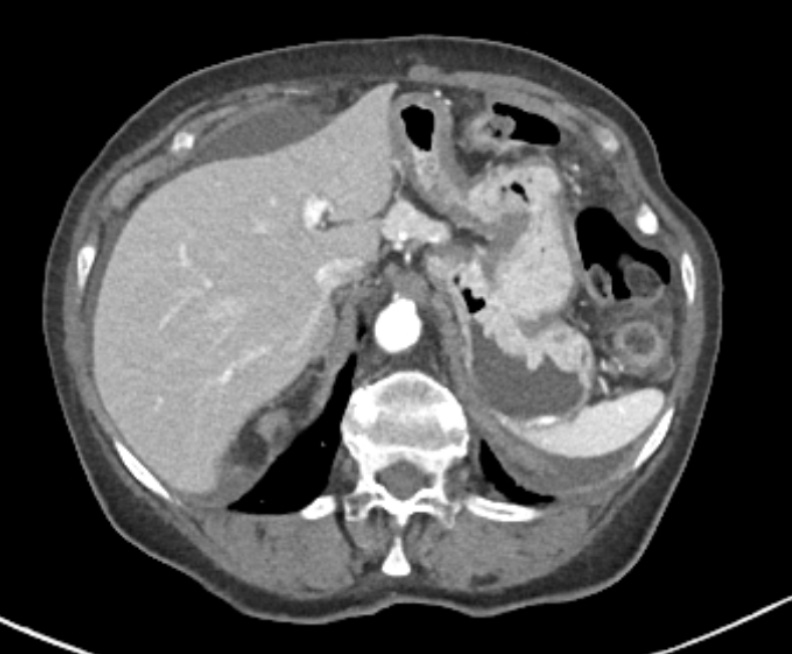Monday Poster Session
Category: Stomach and Spleen
P4234 - An Unusual Cause of Epigastric Pain in the Elderly: A Case of Incomplete Mesenteroaxial Gastric Volvulus
Monday, October 27, 2025
10:30 AM - 4:00 PM PDT
Location: Exhibit Hall

Garrett Shields, DO, MEng
Mercy Hospital St. Louis
Saint Louis, MO
Presenting Author(s)
Garrett Shields, DO, MEng1, Rohan Das, MD2, Ameya Deshmukh, DO3, Marina Kim, DO3
1Mercy Hospital St. Louis, Saint Louis, MO; 2Department of Internal Medicine, Saint Louis University School of Medicine, Saint Louis, MO; 3SSM Health Saint Louis University Hospital, St. Louis, MO
Introduction: Gastric volvulus is a rare, potentially life-threatening condition caused by abnormal rotation of the stomach. While gastric volvulus has a bimodal distribution affecting infants and adults over 50, it remains underrecognized in elderly patients, leading to low clinical suspicion and delayed diagnosis. Prompt recognition is essential to prevent complications such as ischemia, necrosis, and perforation. We present a unique case of incomplete mesenteroaxial gastric volvulus in an elderly patient.
Case Description/
Methods: An 85-year-old female with history of coronary artery disease, hypertension presented with epigastric pain, nausea, and dizziness beginning suddenly after dinner the previous evening. Physical exam revealed epigastric tenderness, stable vital signs, BMI of 26; biochemical markers were unremarkable. CT imaging showed superior displacement of the stomach and antropyloric narrowing, suggestive of mesenteroaxial volvulus without obstruction or ischemia. Given her stability and imaging findings, endoscopic evaluation was pursued. Endoscopy confirmed a Hill Grade III hiatal hernia and a twisted, S-shaped stomach with pyloric obstruction. Gentle manipulation achieved successful detorsion. She later underwent laparoscopic hiatal hernia repair with gastropexy, with an uneventful recovery.
Discussion: This case emphasizes several key points. First, gastric volvulus in the elderly may present without Borchardt's classic triad of epigastric pain, nonproductive retching, and inability to pass a nasogastric tube. Second, Mesenteroaxial volvulus, while less common than organoaxial volvulus, frequently occurs secondary to anatomic predisposing factors such as hiatal hernia. Third, while endoscopic detorsion may be a safe and effective initial treatment for non-ischemic, partial gastric volvulus—especially in elderly patients for whom surgery poses increased risk—definitive surgical repair remains essential to prevent recurrence.
In summary, this case highlights the importance of maintaining a high index of suspicion for gastric volvulus in elderly patients with vague upper GI symptoms and known anatomic risk factors. Early imaging, endoscopic intervention can be a bridge to timely surgical intervention can lead to favorable outcomes even in higher-risk patients.

Figure: Figure 1: Showing mesenteroaxial gastric volvulus

Figure: Figure 2: CT-Abdomen/Pelvis displaying mesenteroaxial gastric volvulus
Disclosures:
Garrett Shields indicated no relevant financial relationships.
Rohan Das indicated no relevant financial relationships.
Ameya Deshmukh indicated no relevant financial relationships.
Marina Kim indicated no relevant financial relationships.
Garrett Shields, DO, MEng1, Rohan Das, MD2, Ameya Deshmukh, DO3, Marina Kim, DO3. P4234 - An Unusual Cause of Epigastric Pain in the Elderly: A Case of Incomplete Mesenteroaxial Gastric Volvulus, ACG 2025 Annual Scientific Meeting Abstracts. Phoenix, AZ: American College of Gastroenterology.
1Mercy Hospital St. Louis, Saint Louis, MO; 2Department of Internal Medicine, Saint Louis University School of Medicine, Saint Louis, MO; 3SSM Health Saint Louis University Hospital, St. Louis, MO
Introduction: Gastric volvulus is a rare, potentially life-threatening condition caused by abnormal rotation of the stomach. While gastric volvulus has a bimodal distribution affecting infants and adults over 50, it remains underrecognized in elderly patients, leading to low clinical suspicion and delayed diagnosis. Prompt recognition is essential to prevent complications such as ischemia, necrosis, and perforation. We present a unique case of incomplete mesenteroaxial gastric volvulus in an elderly patient.
Case Description/
Methods: An 85-year-old female with history of coronary artery disease, hypertension presented with epigastric pain, nausea, and dizziness beginning suddenly after dinner the previous evening. Physical exam revealed epigastric tenderness, stable vital signs, BMI of 26; biochemical markers were unremarkable. CT imaging showed superior displacement of the stomach and antropyloric narrowing, suggestive of mesenteroaxial volvulus without obstruction or ischemia. Given her stability and imaging findings, endoscopic evaluation was pursued. Endoscopy confirmed a Hill Grade III hiatal hernia and a twisted, S-shaped stomach with pyloric obstruction. Gentle manipulation achieved successful detorsion. She later underwent laparoscopic hiatal hernia repair with gastropexy, with an uneventful recovery.
Discussion: This case emphasizes several key points. First, gastric volvulus in the elderly may present without Borchardt's classic triad of epigastric pain, nonproductive retching, and inability to pass a nasogastric tube. Second, Mesenteroaxial volvulus, while less common than organoaxial volvulus, frequently occurs secondary to anatomic predisposing factors such as hiatal hernia. Third, while endoscopic detorsion may be a safe and effective initial treatment for non-ischemic, partial gastric volvulus—especially in elderly patients for whom surgery poses increased risk—definitive surgical repair remains essential to prevent recurrence.
In summary, this case highlights the importance of maintaining a high index of suspicion for gastric volvulus in elderly patients with vague upper GI symptoms and known anatomic risk factors. Early imaging, endoscopic intervention can be a bridge to timely surgical intervention can lead to favorable outcomes even in higher-risk patients.

Figure: Figure 1: Showing mesenteroaxial gastric volvulus

Figure: Figure 2: CT-Abdomen/Pelvis displaying mesenteroaxial gastric volvulus
Disclosures:
Garrett Shields indicated no relevant financial relationships.
Rohan Das indicated no relevant financial relationships.
Ameya Deshmukh indicated no relevant financial relationships.
Marina Kim indicated no relevant financial relationships.
Garrett Shields, DO, MEng1, Rohan Das, MD2, Ameya Deshmukh, DO3, Marina Kim, DO3. P4234 - An Unusual Cause of Epigastric Pain in the Elderly: A Case of Incomplete Mesenteroaxial Gastric Volvulus, ACG 2025 Annual Scientific Meeting Abstracts. Phoenix, AZ: American College of Gastroenterology.
